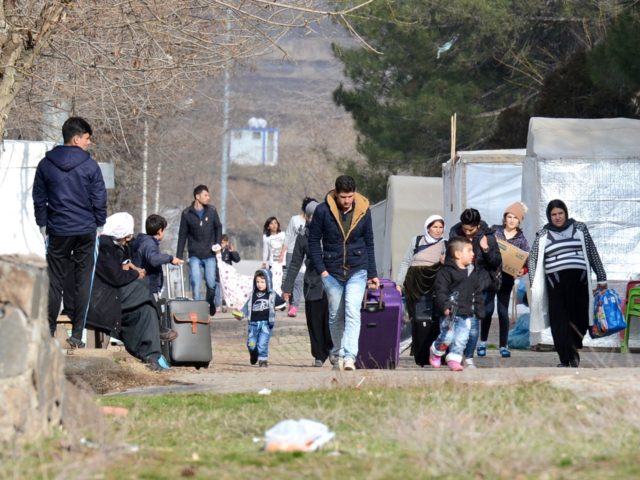Kurdish outlets and Turkish state media confirmed a Turkish airstrike on Yazidi territory in northern Iraq Monday, reportedly targeting a Yazidi militia formed in the aftermath of the Islamic State’s genocide against their people.
The airstrikes reportedly occurred in Sinjar, the site of the 2014 genocide against the Yazidi people. Yazidis are a religious minority native to northern Iraq whose major population center was in Sinjar, where the Islamic State forced thousands to choose between being killed in their city or fleeing up Mount Sinjar to an almost certain death.
Jihadists believe that Yazidis worship Lucifer and consider them among the most objectionable “infidels.” The Yazidis worship a monotheistic god and believe that he sent an angel, Melek Taus, to rule the earth as its king, and submit to the angel’s will. The Yazidi religion does not accept converts.
According to the Kurdish outlet Rudaw, Turkish warplanes struck a military base belonging to the Shingal [Sinjar] Protection Units (YBS), a Yazidi militia that cooperates with the Kurdistan Workers’ Party (PKK). The PKK is a U.S.-designated Marxist terrorist group that Turkey has used as its excuse to invade Syria as part of “Operation Peace Spring,” which began last month, and to conduct targeted strikes within Iraqi territory, but without Baghdad’s approval.
“A warplane, who our friends say is from Turkey struck a base of our YBS [Shingal Protection Units] friends,” Khalaf Khudeda, a local Yazidi official, told Rudaw, stating that there was not at press time information on how many, if any, were injured or killed by the strike. The airstrike reportedly occurred in the village of Khanasor, northwest of Sinjar.
Kurdistan 24 also confirmed the attack and added that their sources confirmed at least two YBS members injured and “significant material damage” to Sinune, Sinjar, the district that Khanasor lies in. The mayor of Sinune, Khodeida Chooke, reportedly confirmed the damage and said that the strikes forced civilians to flee the area.
Anadolu Agency, the official news agency of the Turkish state, quoted the Turkish Defense Ministry as confirming the attack and two “neutralizations” – a term the Turkish government uses for casualties and surrenders, meaning that the individual “neutralized” cannot or chooses not to participate in combat anymore. The term deliberately obscures whether or not the person in question is dead, injured, or simply no longer fighting.
The defense ministry said the attacks were “continuing” in northern Iraq and were part of something called “Operation Claw,” an invasion of Iraq to eradicate the PKK from its Sinjar stronghold.
The Iraqi government, which has repeatedly demanded that Turkey stay within its borders, has not at press time issued a statement on the airstrike. Iraq’s president, Barham Salih, arrived in Erbil, the capital of Iraqi Kurdistan, on Monday, to meet with its senior leadership.
Turkish President Recep Tayyip Erdogan has repeatedly threatened a full invasion of Sinjar, just as he had with Syrian Kurdistan (Rojava) before the launch of “Operation Peace Spring.”
In March 2018, Erdogan warned, “We have told the central [Iraqi] government that the PKK is establishing a new headquarters in Sinjar. If you can deal with it, you handle it. But if you cannot we will suddenly enter Sinjar one night and clear this region of terrorists.”
Some consider Yazidis ethnic Kurds, though some Yazidis dispute the label. As part of what the PKK considers a greater Kurdish community, the terrorist group entered the Sinjar war theater in 2014 to help repel the Islamic State and safeguard local Yazidi populations. Some reports indicated conflict between the local Yazidis and the incoming PKK.
“The PKK is the main reason behind the delay of the Shingal operation,” Qasim Shesho, the head of the Yazidi forces organized to resist ISIS occupation in August 2014, told Rudaw a year later, when ISIS still occupied significant Sinjar territory. “Let them go and save the Kurds in Syria and Turkey, but we will never let them gain power over Shingal.”
During the initial ISIS onslaught, however, reports indicated that the Peshmerga, the official forces of Iraq’s Kurdistan Regional Government (KRG), withdrew from the battlefield, leaving only the PKK and Yazidi militias like the YBS. The KRG has resolutely resisted the presence of PKK forces in Iraqi Kurdistan, as it does not subscribe to its Marxist ideology and enjoys mostly friendly relations with Turkey.
The group ultimately eradicated the Islamic State terrorists in the city, but by then, Sinjar was reduced to mostly rubble, making it difficult for civilian families who survived the genocide to return.
“The PKK should leave Sinjar. Today’s presence of the PKK in Sinjar causes instability in the region,” then KRG Prime Minister Nechirvan Barzani said in December 2016. Barzani is currently the president of the KRG.
In 2017, local officials reported that the PKK was helping arm the Yazidis and train them for battle in the event of another jihadist invasion.
“The PKK assists the Yezidis to create a self-defense force and administrative institutions,” the Group of Communities in Kurdistan (KCK), a political body operative in the region tied to the PKK, said in a statement that year. “Once the Yezidis have their own protection force and independent administration, then the PKK’s ambitions will be fulfilled in Shingal.”
Later that year, reports surfaced that some Yazidi fighters dissatisfied with the PKK were defecting to the Popular Mobilization Forces (PMF), a coalition of mostly Shiite Arab militias allied with Iran and currently a legal branch of the Iraqi armed forces.

COMMENTS
Please let us know if you're having issues with commenting.